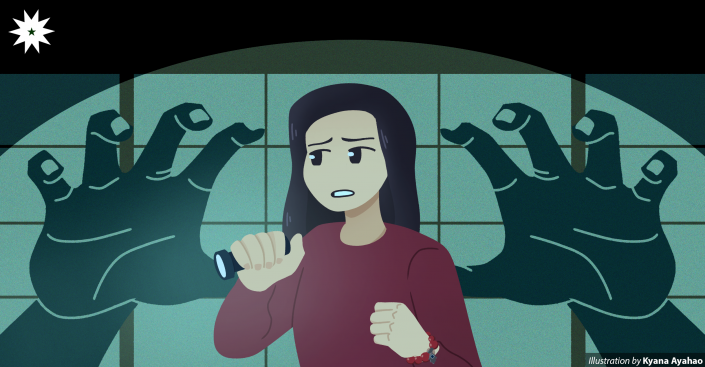For 46 years, the Metro Manila Film Festival (MMFF) has been a fixture of Filipino Christmastime. Starting December 25 each year, families would flock to cinemas like clockwork for a lighthearted Christmas spectacle—you have the Vic Sotto ensemble film with the banal jokes and the revolving door of fresh-faced loveteams, the gaudy self-deprecating Vice Ganda flicks, the experimental drama that will make a killing on awards night, and the occasional horror film for those not watching with their grandparents.
This year, however, is different—in more ways than one. Due to physical distancing constraints, the festival is going digital for the first time through Upstream.ph. This shift presents a diverging of paths for the MMFF. For one, the familiar faces that used to dominate the lineup every year are now conspicuously absent. Second, this streaming platform is not regulated by the Movie and Television Review and Classification Board, giving way to fresh content not usually seen under the festival’s auspices. This results in a clash of the old and new for the MMFF 2020—one of the more interesting lineups we’ve seen in a few years.

Magikland, Addie
Filled with floating islands, mythical creatures, and magical powers, Magikland is your typical foray into fantasy not unlike Encantadia or Enteng Kabisote. The film follows Director Christian Boy (Miggs Cuaderno), Kit (Princess Aliya), Pat (Joshua Eugenio), and Mara (Elijah Alejo) as they attempt to save the fantastical world they find themselves in.
Obviously made to be a popcorn flick, it leans more on its flashy visuals rather than its story. The storyline greatly suffers from a lack of characterization, with its characters half-baked at best and paper-thin caricatures at worst. Although suspension of disbelief is a given in any fantasy film, the transition to the world of Magikland from the real world felt jarring and unrealistic as certain elements were overplayed. Moreover, the performance of the actors lacked sincerity as they phoned in over-the-top performances.
However, the effort to include different elements of Philippine mythology and culture in its world-building is nothing short of laudable, and with the promising computer generated imagery (CGI) breathing life into the story, Magikland is ultimately a veritable—if not forgettable—crowd pleaser.
Rating: 1.5/4.0

Coming Home, Marypaul
Prolific director and screenwriter Adolfo Alix Jr.’s latest drama chronicles a family’s tumultuous journey to reconciliation and forgiveness. Salve (Sylvia Sanchez) is a mother who takes pride in her kids and their impending adulthood. The return of her estranged husband Benny (Jinggoy Estrada) upends their lives as familial bonds are put to the test.
What could have been an interesting exploration of the Filipino family dynamic results in something trite and unspectacular. The film’s greatest and only feat is Sanchez’s portrayal of a mother’s balancing act as she navigates through the chaos in her family life. Unfortunately, she is accompanied by a less-than-stellar cast, which made the movie a rather tedious watch. The film’s cinematography is not particularly noteworthy either, except for the bluish hue in the flashback scenes leading up to the husband’s departure.
Coming Home works on paper—it has all the hallmarks of the beloved Filipino family drama formula: the veterans, the heartwarming story, the experienced director at the helm. Yet, the film fails to elicit anything more than yawns.
Rating: 1.0/4.0

The Missing, Charlene
Regal Entertainment—known for iconic horror films like the Shake, Rattle, and Roll franchise—rolls out a new film directed by Easy Ferrer. The Missing is set in Japan where Iris (Ritz Azul), is restoring the ancestral home of an old professor with bubbly intern Len (Miles Ocampo) and old flame Job (Joseph Marco). Central to the plot is the Japanese culture of preserving their houses as a form of respect—even if it requires certain sacrifices. The cinematography reflects this morbidity, showing how the home’s sturdy exterior succumbs to decay with rapidly cracking walls and blackening floorboards.
Azul’s performance as Iris is chillingly moving, handling the character’s battle with the horrors of both her past and her present with skill. But the pale and emaciated ghosts in the house arrive too often and too predictably, and without significant consequence to the story. Additionally, overused cinematic tricks such as figures hovering on the peripheral view were lukewarm attempts at scaring the viewers.
While it fails to reach the iconic status of the studio’s previous films, The Missing presents a skillful homage to Japanese horror cinema with its incorporation of cultural and psychological elements into the narrative.
Rating: 3.0/4.0

Tagpuan, Glenielle
At first glance, Tagpuan seems like the amalgamation of various romance films—it has the fortuitous meeting of Before Sunrise, the elusive heroine of Eternal Sunshine of the Spotless Mind, the exploration of an old love in a foreign country in My Ex and Whys, and the reflection of the Filipino diaspora in Hello, Love, Goodbye. These elements may be enough to warrant a cursory viewing, but not much else can save the film from failing to stick the landing.
Alfred Vargas leads the cast as Allan, a stoic businessman who reconnects with his ex-wife Agnes (Iza Calzado) in New York and also meets Tanya (Shaina Magdayao) in Hong Kong. Vargas’ wooden performance severely impairs the film, failing to resonate with viewers and ending up to be ultimately irrelevant to the story as the two actresses run circles around him.
The script—penned by Ricky Lee—shines with depth and authenticity when it’s not being stilted by incongruous pacing and hollow acting. In fact, the film’s grit and nuance lies with Calzado and Magdayao as they masterfully depict the Filipina immigrant experience, and Tagpuan’s biggest sin is conveying their stories through the eyes of a man that pales in comparison.
Rating: 2.5/4.0

Isa Pang Bahaghari, Magz
Director Joel Lamangan makes a comeback to the festival with his entry, Isa Pang Bahaghari. Returning to the Philippines, Dom (Philip Salvador) seeks help from his friend Rhey (Michael de Mesa) in making amends with his wife Lumen (Nora Aunor) and his children, played by Zanjoe Marudo, Sanya Lopez, and Joseph Marco.
The compelling tale of Dom, Rhey, and Lumen’s tangled lives is portrayed through chaotic flashback sequences that are more style than substance. Though somewhat enjoyable, this chaotic narrative—especially in the second act—doesn’t bother to untangle the complex themes. The film’s stunning visuals and long pans are only momentarily satisfying. What ties it all together is an ending that could only be described as predictable yet unexpected.
The highlight is the exceptional acting of thespians Salvador, de Mesa, and Aunor. However, in stark contrast to the film’s powerhouse leads, the rest of the cast seem to fade into the background, with some characters even being unnecessary to the story.
The film could be described as charming, yet it is not impactful enough to be memorable. Ultimately, Isa Pang Baghari never brought us to the paradise found at the end of the rainbow.
Rating: 2.0/4.0
This ends part one of The LaSallian’s review of this year’s MMFF 2020 entries. The remaining films are reviewed in part two.
